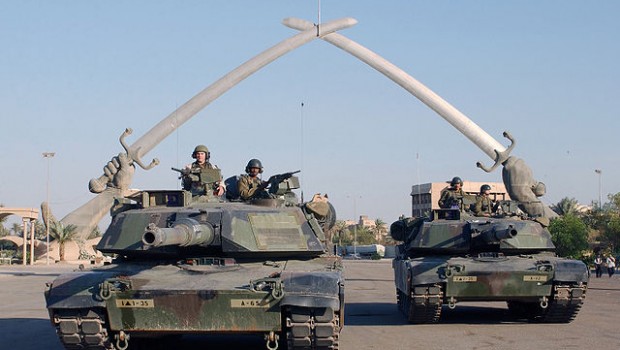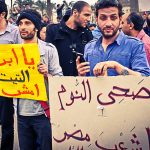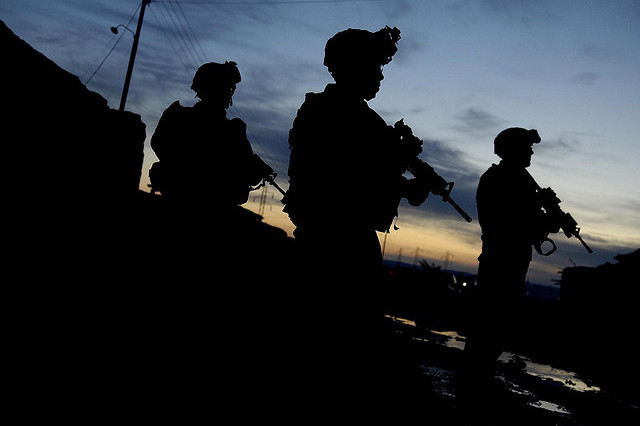by Emile Nakhleh
This year, American policymakers and regimes across the Middle East face three inauspicious anniversaries, which continue to bedevil this country and the region. In the seventeen years since 9/11, the fifteen years since the invasion of Iraq, and the seven years since the Arab spring, Washington has failed to reset its relations with the Middle East on a more sure and enduring footing. Nor do the new appointments of Mike Pompeo as secretary of state, John Bolton as national security advisor, and Gina Haspel as director of the Central Intelligence Agency promise to improve the fractious and unpredictable relationship between America and the Middle East.
Many lessons have emerged from the three anniversaries, which American policymakers and Middle Eastern regimes have ignored, dismissed, or treated with benign neglect. This irresponsible, perilous attitude has helped leaders enhance their own power position and control over their societies. Washington’s two new senior foreign policy appointees, Pompeo and Bolton, should review the history of the world in the past century. They would then realize that the power machinations of US-friendly regimes, achieved on the backs of their peoples, are only a short-term panacea.
The continued usurpation of power by America’s supposed allies through repression and corruption is detrimental to American ideals and interests. If allowed to continue, this power grab will produce more poverty, more anger, more alienation, and more unpredictability.
Since these developments have had deep and direct impact on our national security, American policymakers and intelligence leaders must revisit these three major developments and reassess the lessons that emerged from them. If Secretary of State designate Mike Pompeo and National Security Advisor appointee John Bolton are committed to protecting American interests and personnel in the Middle East in the next five years, they can neither ignore the factors that drove 9/11, the invasion of Iraq, and the Arab Spring nor brush aside the chaotic and destructive consequences that resulted from them.
The war-mongering against Iraq in 2003, to which Bolton was a party, produced untold misery for Iraq. The heated rhetoric against Iran, which Bolton is yet again stoking, is similarly destined to create untold misery for the peoples of the region and serious security threats for American personnel in that part of the world. Pursuing regime change has been a disaster, which seems to be on the verge of repeating itself.
September 11
Almost 17 years have passed since the horrific terrorist attacks on American soil, which killed and injured over 3,000 people. The Trump administration should learn from 9/11 that the terrorists did not attack America because of what it stands for but because of its perceived anti-Islamic policies and that vast majorities of Muslims worldwide do not support terrorism or violence. Defeating a group of terrorists, whether al-Qaeda or the Islamic State (ISIS or IS), or killing its leaders does not eliminate the factors or root causes that helped create terrorism in the first place.
Decapitating terrorist organizations and defeating them—whatever the term “defeat” means in this case—has failed to silence the radicalizers or eliminate the threat of terrorism. Whenever a terrorist leader is killed, another one takes over within a short time. Military operations against these groups have had short-term success but no long-term impact on extremism.
Three key factors have fueled Sunni extremism and terrorism in recent decades. First there’s been regime repression, corruption, and poor economic policies. Second has been the spread of radical Sunni ideology, mostly identified with the Wahhabi-Salafi-Hanbali school of Sunni jurisprudence that flourished in Saudi Arabia for centuries. Finally, Western countries and especially the United States have adopted perceived anti-Islamic policies and waged wars against Muslim countries.
Since most Muslims reject terrorism, and since Muslim world engagement is the best pragmatic approach to fighting terrorism, if Pompeo and Bolton are interested in delegitimizing the radical message, they should not paint the whole Muslim world with a broad brush of terrorism. As secretary of state, Pompeo should speak out forcefully against Islamophobia and persuade Congress to increase funding for tangible engagement projects—for example, agriculture, irrigation, and farming, job-creation start-ups, and vocational and technical education.
In the past 17 years, unfortunately, Washington and other Western capitals have done precious little to engage Muslim communities worldwide. Combating Violent Extremism (CVE) has been more rhetoric than reality. Fighting terrorism should go hand in hand with engaging the millions of mainstream Muslims but should not be a substitute for it.
The Iraq Invasion
The regime change in Iraq following the American invasion 15 years ago has resulted in chaos, destruction, and destabilization, which continue until this day. I frequently briefed senior policy makers on the eve of the Iraq war on the need to learn more about Iraqi society and its deeply embedded religious and political dynamics. I often argued that until US policymakers truly understood that society and its Sunni-Shia divide, they should not go to war blindly.
In reaction to the pushback from one or two senior policymakers, I made three critical points. First, Iraqis’ dislike of Saddam did not mean that they favored a foreign invasion. Second, “liberation” would soon turn into “occupation.” Third, Iran has had deep religious roots in southern Iraq and will always be interested in maintaining a strong foothold in that country. In fact, I gave a quick tutorial about the birth of Shia Islam in southern Iraq and the revered standing of the senior clerics in the Shia seminaries (hawza) in Najaf and Karbala. During Saddam’s rule, many of these clerics had studied in Iran, mostly in the city of Qom. I honestly was saddened by how ill informed senior policymakers were about Iraqi religious and political realities. Several months later, those same policymakers put in motion the invasion of Iraq.
Following the invasion, I participated in a briefing on the dire consequences from the Sunni minority if the occupation administration embarked on the so-called de-Baathification and dissolving the Iraqi army. Unfortunately, Paul Bremmer, then head of the Coalition Provisional Administration (CPA), did just that a few months after the invasion, with the approval of then-Secretary of Defense Donald Rumsfeld. Six months after the invasion, a very senior policymaker asked me to answer two incredible questions: “Why is Iran so interested in Iraq?” and “What is this Shia thing in Iraq?”
Incoming Secretary of State Pompeo and National Security Advisor Bolton should reflect on the calamitous consequences of the regime change in Iraq before they begin to embark on scrapping the Iran nuclear deal or planning a war against Iran. Like the Iraqi people 15 years ago, segments of the Iranian people might not like the theocratic regime in Teheran, but this dislike does not translate into support for a foreign invasion. It was foolish for Vice president Dick Cheney in 2003 to refer to the Iraqi invasion as “liberation.” It would be equally foolish and disastrous today for Pompeo or Bolton to depict any potential invasion of Iran as “liberation.”
The Arab Spring
Seven years ago, millions of young Arab men and women filled the streets of Tunis, Cairo, Sanaa, Manama, and Damascus to protest dictatorial rule in their countries and demand justice and dignity. The world was filled with hope that the Arab peoples were finally ready to liberate themselves from the yoke of tyranny, repression, and corruption. The presidents of Tunisia, Egypt, and Yemen fell in short order. Other autocratic regimes in Bahrain, Libya, and Syria resisted and, other than the Libyan regime, prevailed.
By mid-2011, the military, intelligence services, and ruling elites in many of these countries began to plot a counter-revolution against the Arab uprising using the security services to crush the protesters. They turned to the United States and Britain for help, falsely arguing that many of the protesters were terrorists or radical Islamists. Saudi Arabia and other oil-rich countries in the Gulf Cooperation Council spent hundreds of billions of dollars staving off internal opposition.
The result, unfortunately for Arab youth, is that the United States returned to its pre-Arab Spring policy of coddling regimes and tolerating their violations of human rights. Thousands of these peaceful protesters are either languishing in jail, dead, or exiled. The human-rights conditions today in several Arab countries—for example, Saudi Arabia, Egypt, Bahrain, and the UAE—are much worse than they were before the Arab Spring. Arab publics now view American diplomacy as indifferent to human rights and that profits from oil and weapons sales drive America’s foreign relations. The traditional balancing of interests and values has completely vanished. Pompeo and Bolton should task their policy and intelligence analysts to explore the possibility that the alienation and anger at the failure of the Arab Spring and Western complicity in the re-emergence of Arab dictators and strongmen could drive Arab youth toward another and more violent Arab Spring. These are the new realities of the “Arab street,” which US policymakers have belittled for years.
Taking these lessons seriously serves the national interest and in the long run enhances the nation’s security. It also serves as a learning experience for the rising generation of policy and intelligence analysts in the US government. This generation of analysts in turn will be better positioned to educate policymakers and inform policy. Based on my government experience with “lessons learned” and policy and intelligence “failures” in anticipating several important developments, ranging from the 1973 Arab-Israeli war to the 9/11 attacks on the homeland, I am not optimistic. I doubt Trump’s so-called war cabinet will use these lessons to guide their future efforts to promote regime change, empower friendly autocratic regimes, or plot yet another war against a Muslim country.






In June 2005, Sec of State Rice stated in speech at the American University in Cairo:
“For 60 years, my country, the United States, pursued stability at the expense of democracy in this region here in the Middle East — and we achieved neither. Now, we are taking a different course. We are supporting the democratic aspirations of all people.”
Then the US proceeded to support General Sisi who took over in a coup d’etat, and who was responsible for the Rabaa Massacre: the biggest mass killing of peaceful demonstrators in a single day.
Because of our ego, we learned the wrong thing about Iraq. The current WA consensus is that it teaches us …. ‘not to withdraw because it creates a vacuum, like when ISIS swept into Iraq after we pulled out’.
Lessons we should have learned …
1. Govts in exile cannot come back and govern a country.
We tried this in Iraq, Libya, and people want to do this again in Iran with MEK.
2. The destruction of govt institutions leads to chaos and terrorism.
Today WA is clamoring for Assad’s head. We ‘beat’ ISIS in Syria but not Afghanistan, why, because Assad, the Russians, Hezbollah and Iranians were also fighting against ISIS but we learned another anti-lesson, ‘our military can do anything if unleashed’.